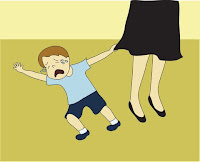Aspergers Kids & Temper Tantrums in Public

"What do you suggest we do when we are out shopping and our Aspie son has a massive temper tantrum right there in the store for all to see?" All moms and dads have experienced the tempter tantrum in the grocery store or restaurant. While kids with Aspergers and High-Functioning Autism may have tantrums that seem larger than life at times, they are still tantrums. Here are some tips: Prior to going on out somewhere, it is important that your Aspie is prepared for what is going to take place. Explain where you are going, what you will be doing, and how long you will be doing it. Use a picture story board that describes the basic steps of a shopping trip (one that you have already created for such an event). You may want to have your child engage in some physical activity and play so that he's calm for the outing. You will want to establish what the expectations are for your child's behavior during the outing. State these expectations immediately before exi

